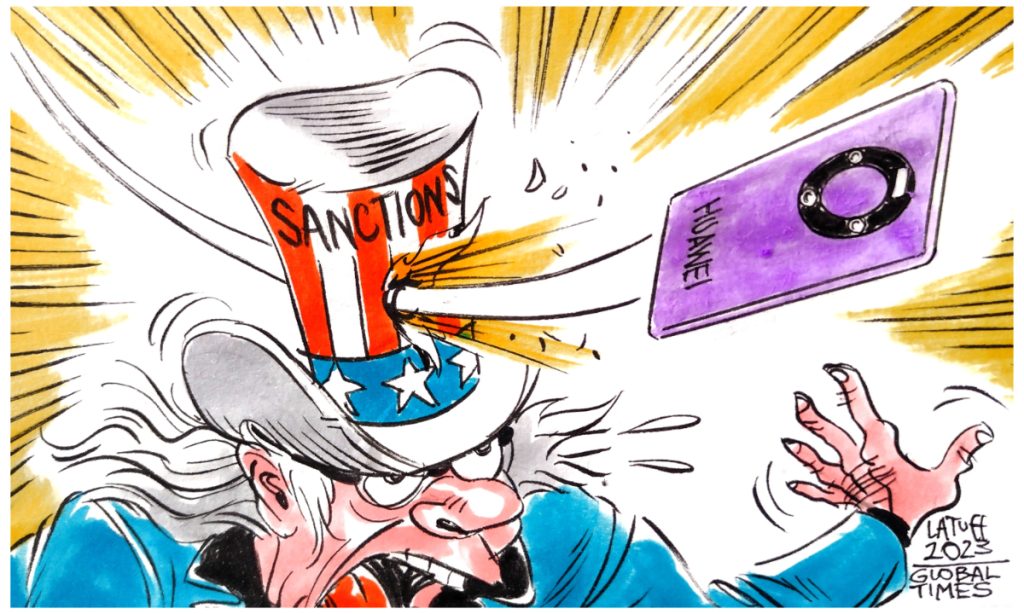Neither Huawei nor Chinese people need to be intimidated by US lawmakers’ threat of new sanctions

Some members of the US House of Representatives' committee on China and the House Foreign Affairs Committee on Wednesday called for a total ban on all technology exports to Huawei and Semiconductor Manufacturing International Corporation (SMIC). This appeared to frighten Chinese investors, and as a result, shares of SMIC and Chinese artificial intelligence chip developer Cambricon Technologies plummeted on Thursday.
US lawmakers have always been the most radical anti-China force, so how can we be intimidated by a few clamors from them? While there exists the possibility that the US will further increase its ban on China's technology, it is highly unlikely that Washington will be able to destroy Huawei's Kirin 9000S processor. The possibility of the US resorting to increased suppression was surely expected by Huawei and its partners. Huawei has always kept a low profile, and the Chinese government doesn't hype up the company's technological breakthroughs. But how can a technological breakthrough that tech enthusiasts can discover via a teardown of the handset be hidden from the US tech community and intelligence system?
Since Huawei is bringing the Mate 60 Pro smartphone to the market, it should be fully confident about keeping its supply chain intact and maintaining and expanding its production capacity. Wouldn't that be a joke if the US upgraded its chokehold, leading the Mate 60 Pro supply and production chain to collapse easily? In that case, why would Huawei hurry to launch the Mate 60 series? Why wouldn't it solidify its technological breakthroughs and wait to release the smartphones at a better time to show its hands with Washington?
Huawei CEO Ren Zhengfei has been through various battles. Some years ago before the rainstorm of sanctions started to pour down on Huawei, he had started to prepare for a rainy day by asking HiSilicon, one of Huawei's subsidiaries, to make great efforts in looking for a back-up plan. Now the US has carried out rounds of sanctions and more severe ones may come, Ren will not pull a stunt and covet a quick cash grab by pushing his company and its partners toward a more dangerous situation.
Now, the US sanctions system has the advantage over the way Huawei and similar companies develop technological breakthroughs. The US side is not very clear if the Kirin 9000S processor is actually Huawei's own product or produced with the help of some other companies. Neither does it know what the technical route exactly is.
Besides, a few things are certain:
First, the technology of designing and producing Kirin 9000S is already mature, and the production capacity of this chip can be formed relying on the existing supply chain at home. Otherwise, Huawei would not launch the Mate 60 series because that would mean trouble.
Second, in the next competition, Huawei and other companies on the supply chain need to integrate and interact with market resources. Market resources can push Huawei to continue to progress; they have been more important than quietly obtaining some foreign technology to develop products and technologies. With the interaction with market resources, the iteration of semiconductor technology can be realized by the continuous advancement of those resources. The Kirin 9000S is now on the threshold of such progress.
Third, Huawei has found a way to break through the US sanctions, which shows a fundamental loophole in Washington's sanction system. Those brainless legislators are only fanatical, imagining out of thin air that they can kill the Kirin 9000S by tightening the sanctions. They don't understand that encrypting the sanctions system is a very complex systematic project and an almost impossible challenge.
Washington would need to completely reshape the sanctions system to do this, requiring companies in the US and allied countries to suffer much larger losses than in the past, which is equal to sanctioning these companies. Besides, the US simply is not sure that reorganizing the sanctions system will produce the results it wants, because that process is bound to be very difficult - a great deal of resentment may occur, but the outcome is still undetermined.
The fact that Huawei has launched the Mate 60 Pro shows that it has the certainty to fight the new rounds of US sanctions. The reason why the company keeps a low profile is the traditional Chinese thinking of doing more and saying less to avoid intensifying a new confrontation and giving the other side an out. And it's not a fear of being crushed in a battle.
Huawei, of course, still has a long way to go and hard battles to fight, but ambitions of seeking a blockade to hold technologies in a "small yard and high fence" and have them all to oneself have never been successful throughout history. From aviation to space to deep-sea technology, which one of them is under a country's monopolization? Semiconductors will be no exception.
The US can develop faster, but it is impossible to bind the feet of such a large country as China to stop it from moving forward. Huawei is a secular bird; it has already taken wing under the harsh sanctions of the US, and its wings will surely grow to be more and more powerful.
We the Chinese people should become more confident. Let's support Huawei and all the Chinese high-tech companies that the US has suppressed together. It is delusional for the US to think that it can deprive the Chinese people of the right to realize and enjoy scientific and technological progress.